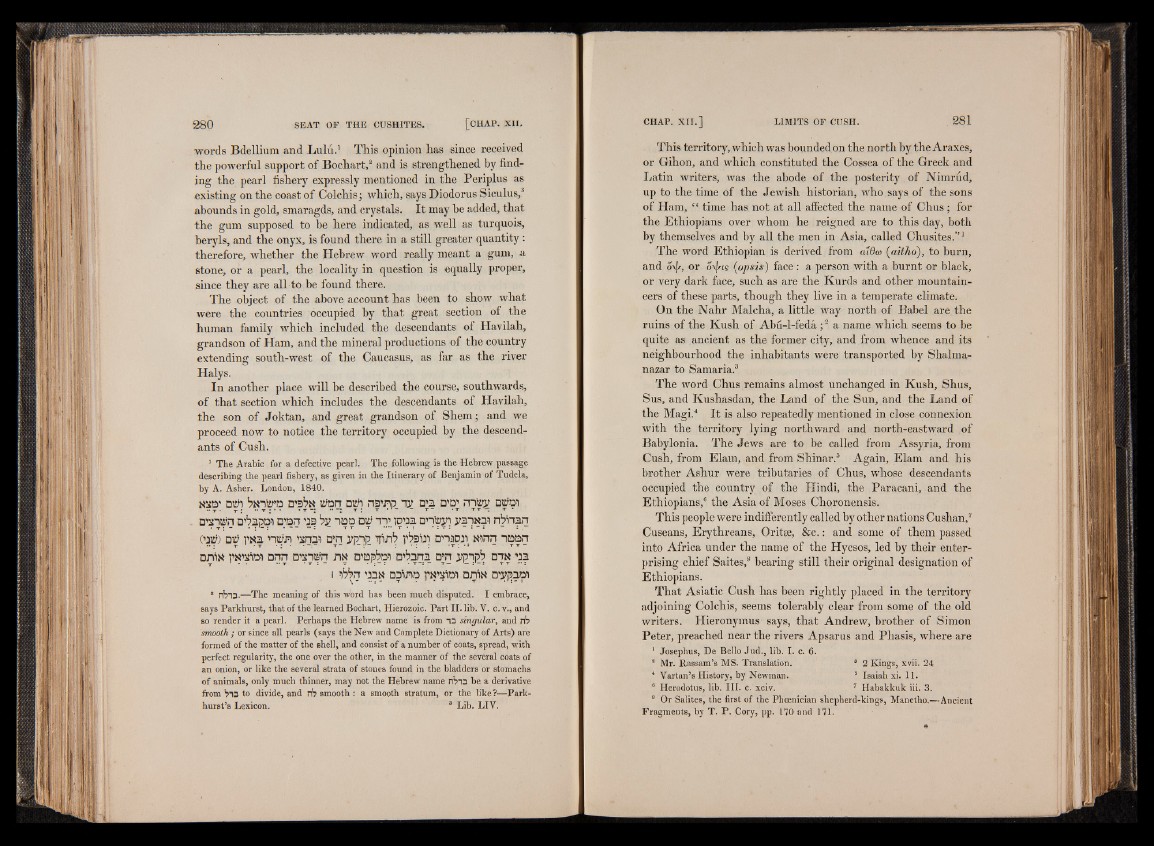
■words Bdellium and Lulu.1 This opinion has since received
the powerful support of Bochart,2 and is strengthened hy finding
the pearl fishery expressly mentioned in the Periplus as
existing on the coast of Colchis; which, says Diodorus Siculus,3
abounds in gold, smaragds, and crystals. It may be added, that
the gum supposed to be here indicated, as well as turquois,
beryls, and the onyx, is found there in a still greater quantity:
therefore, whether the Hebrew word really meant a gum, a
stone, of a pearl, the locality in question is equally proper,
since they are all to be found there.
The object of the above account has been to show what
were the countries occupied by that great section of the
human family which included the descendants of Havilah,
grandson of Ham, and the mineral productions of the country
extending south-west of the Caucasus, as far as the river
Halys.
In another place will be described the course, southwards,
of that section which includes the descendants of Havilah,
the son of Joktan, and great grandson of Shem; and we
proceed now to notice the territory occupied by the descendants
of Cush.
1 The Arabic for a defective pearl. The following is the Hebrew passage
describing the pearl fishery, as given in the Itinerary of Benjamin of Tudela,
by A. Asher. London, 1840.
ksd- otth VtfVs ttfan Dim nswp " T • T ; “ T;** • T T ; T • ' - ij?- i Tl l- D'D• X' ¡BTTh-; BXr •a
D ^ n itinB l l l i l I p n a s by n a a Dtf T r i p a s o n t o y i y s sK n i n b m n
(a.t.t. i) Dixd i'm• ta nt• d; n■ 51• ml Dsxn — yp*—n p ¡111; ¡¡¡• 1; 0; M*tB : * s »inn— n• ar ar n—
DniN VN'siai onn D'sntdn m D'apbai n'bins dvt ypnpb on« aa
i ibbn aa« oai.no pN’siai nniK D'ypapi
2 nbin.—The meaning of this Word has been much disputed. I embrace,
says Parkhurst, that of the learned Bochart, Hierozoic. Part II. lib. V. c. v., and
so render it a pearl. Perhaps the Hebrew name is from 13 singular, and rib
smooth ; or since all pearls (says the New and Complete Dictionary of Arts) are
formed of the matter of the shell, and consist of a number of coats, spread, with
perfect regularity, the one over the other, in the manner of the several coats of
an onion, or like the several strata of stones found in the bladders or stomachs
of animals, only much thinner, may not the Hebrew name he a derivative
from Via to divide, and rb smooth : a smooth stratum, or the like ?—Park-
hurst’s Lexicon. 3 Lib. LIV.
This territory, which was bounded on the north by the Araxes,
or Gihon, and which constituted the Cossea of the Greek and
Latin writers, was the abode of the posterity of Nimrúd,
up to the time of the Jewish historian, who says of the sons
of Ham, “ time has not at all affected the name of Chus; for
the Ethiopians over whom he reigned are to this day, both
by themselves and by all the men in Asia, called Chusites.”1
The word Ethiopian is derived from a 16a (aitho), to burn,
and oA, or o\^;? (opsis) face: a person with a burnt or black,
or very dark face, such as are the Kurds and other mountaineers
of these parts, though they live in a temperate climate.
On the Nahr Malcha, a little way north of Babel are the
ruins of the Kush of Abú-1-fedá ;2 a name which seems to be
quite as ancient as the former city, and from whence and its
neighbourhood the inhabitants were transported by Shalma-
nazar to Samaria.3
The word Chus remains almost unchanged in Kush, Shus,
Sus, and Kushasdan, the Land of the Sun, and the Land of
the Magi.4 It is also repeatedly mentioned in close connexion
with the territory lying northward and north-eastward of
Babylonia. The Jews are to be called from Assyria, from
Cush, from Elam, and from Shinar.5 Again, Elam and his
brother Ashur were tributaries of Chus, whose descendants
occupied the country of the Hindi, the Paracani, and the
Ethiopians,6 the Asia of Moses Choronensis.
This people were indifferently called by other nations Cushan,7
Cuseans, Erythreans, Oritse, &c.: and some of them passed
into Africa under the name of the Hycsos, led by their enterprising
chief Saites,8 bearing still their original designation of
Ethiopians.
That Asiatic Cush has been rightly placed in the territory
adjoining Colchis, seems tolerably clear from some of the old
writers. Hieronymus says, that Andrew, brother of Simon
Peter, preached near the rivers Apsarus and Phasis, where are
1 Josephus, De Bello Jud., lib. I. c. 6.
2 Mr. Rassam’s MS. Translation. 3 2 Kings, xvii. 24
4 Vartan’s History, by Newman. 5 Isaiah xi. 11.
8 Herodotus, lib. III. c. xciv. 7 Habakkuk iii. 3.
“ Or Salites, the first of the Phoenician shepherd-kings, Manetho.—Ancient
Fragments, by T. P. Cory, pp. 1)0 and 171.